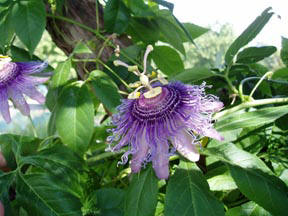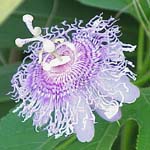Naturopathic health
Passion Flower Herbal Remedy
|
Benefits of Passion Flower - Passiflora incarnata Passion flower information Passionflower is used by herbal practitioners as a sedative, anti-spasmodic, anodyne and nervine. Passionflower can be used for: Insomnia due to mental worry and overthinking Anxiety and hysteria Restlessness, twitching, nervous spasms Parkinson’s disease Nervous headache Spasmodic conditions such as painful periods, asthma and epilepsy Neuralgia Shingles Side-effects None expected Active compounds Alkaloids including harman and harmine, flavones, sterols, gums, sugars What herbal practitioners say about Passionflower Passionflower is great for treating insomnia, especially when it’s due to worrying and over thinking, without the side effects of ‘narcotic hangover’ like so many sleeping tablets. It is also very useful in the treatment of painful periods and intestinal cramping, having an anti-spasmodic effect. It is these anti-spasmodic properties that make if very useful in the treatment of tremors, like those experienced in Parkinson’s disease, seizures as in epilepsy, and in asthma especially where it is brought on by nervousness, tension and anxiety. Passionflower can be used in the treatment of nerve pain, such as neuralgia and the pain caused by shingles. Passionflower can be combined with valerian and oat seed in the treatment of insomnia. Tincture dose Adult dose 1 2mls three times a day. Children’s dose (6 – 12 years old) 0.5 – 0.8mls three times a day. Based on ratio of herb to alcohol of 1:3 Naturopaths treat the whole person not just the disease or condition. That's why you cannot use this site for diagnosis or treatment. The information we provide should not be treated as a substitute for medical advice or treatment. We recommend that you visit a qualified naturopath or find a GP who is sympathetic to a naturopathic approach. Click here for our full disclaimer. |
Research homeHerbal remediesAdvice on buying herbal remedies
|
|
|
|
|
|
|
|
||
|
|
|
If your starting to move towards a healthy diet and you want to take a major step forward then a detoxification programme can make a big difference. Click on the link below to find out more. Healthy Recipes Juicing SupplementsBach Flower Herbal Acupuncture Homeopathy DetoxificationMassage Qi Gong Nutrition & Diet Iridology Tissue Salts |









